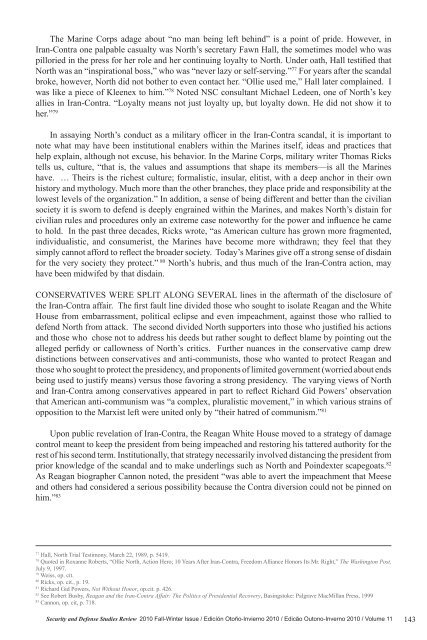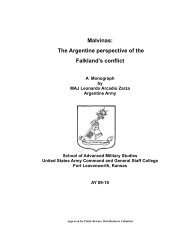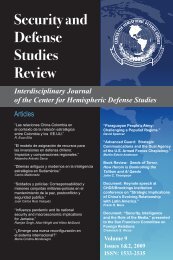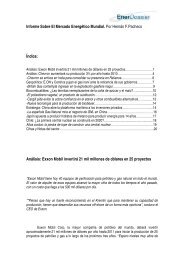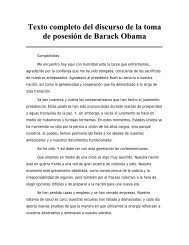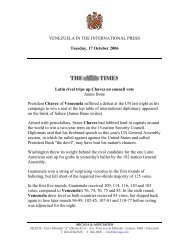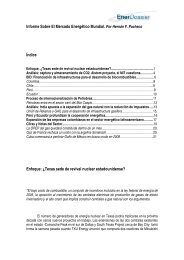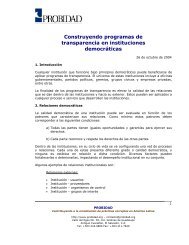public than Kelly, taking issue with not only what North said, or did not say, <strong>and</strong> did or did not do,regarding Iran-Contra, but even challenging the personal story that he had spun for himself <strong>and</strong>for the public. In his study of the Marine Corps, Making the Corps, military journalist Thomas E.Ricks observed that the service’s orientation on the front line combatant <strong>and</strong> its small size “seems tohave encouraged both a sense of brotherhood <strong>and</strong> a culture of c<strong>and</strong>or within the Corps that the otherservices lack.” To which he added: “To be sure, there are liars, knaves, <strong>and</strong> cheats within the Corps, asthere are anywhere—<strong>and</strong> the Corps’ liars can be whoppers, as Lt. Col. Oliver North demonstrated.” 72Lt. Gen. Victor H. Krulak, the legendary “paramarine” during World War II, challenged the veracityof North’s tales about his derring-do in Vietnam, saying: “His combat exploits in Vietnam areromanticized, like the Sunday-supplement tale of his valiant single-h<strong>and</strong>ed midnight forays into the(Demilitarized Zone) to capture <strong>and</strong> bring back a North Vietnamese prisoner. It is an exciting story,but like many others, it never happened.” 73Ultra-conservative retired Army Major General John Singlaub, highly-decorated officer, afounding member of the Central Intelligence Agency, <strong>and</strong> a vocal Contra supporter also found achasm between the North people thought they knew <strong>and</strong> the Marine lieutenant colonel he knew: “Topeople all over the world Ollie North was a hero. But I knew better. There was a wide gap betweenthe media image of Ollie North--the honest, loyal Marine--<strong>and</strong> the sordid reality of his true character<strong>and</strong> performance.” 74 Even retired Air Force Gen. Richard Secord, a key North ally, said that he hadbalked at an attempt by McFarlane <strong>and</strong> North to create “plausible deniability” for Reagan on theissue of the arms transfers. Plausible deniability, he said, “is <strong>and</strong> always will be an important toolfor covert operations, but it has to be built into the plan. You can jury-rig something after the fact… I was doubly upset about this now, with Congressional hearings looming, <strong>and</strong> really ticked atMcFarlane <strong>and</strong> disappointed in Ollie for going along with him because we were no longer fussingwith talking papers, but giving testimony under oath to Congress. There is a big difference betweenpeddling dis<strong>info</strong>rmation as a cover story <strong>and</strong> committing perjury.” (italics added) 75Other aspects of North’s conduct came into question from various quarters within the military.For example, although North tried to portray his l<strong>and</strong>ing at London’s Heathrow airport, <strong>and</strong> hissubsequent encounters with immigration officials using a false identity, in a humorous vein, Col.Anthony E. Hartle, the director of the philosophy program at West Point wrote: “However st<strong>and</strong>ardsuch an exchange may be for an espionage agent, it may be questionable for a Marine officer,whose professional ethic places great emphasis on honesty <strong>and</strong> truth-telling to lie purposefully <strong>and</strong>substantively to officials of a friendly nation.” North’s efforts to backdate checks <strong>and</strong> to hide the factthat a third party paid for an expensive security system installed at his Virginia home were viewedby Hartle as suggesting that North “might have set aside the moral discrimination between truth<strong>and</strong> falsehood that served him well as a midshipman at the Naval Academy <strong>and</strong> as a young Marineofficer.” While it is not unethical for an officer to mislead the enemy, he wrote, North’s treatmentof Congress, FBI <strong>and</strong> NSC security staff agents, <strong>and</strong> those directed by Reagan to investigate thesc<strong>and</strong>al, all suggested that they could “be deceived in the name of a greater good known only toNorth <strong>and</strong> other members of the covert operations group. … When the inefficiency <strong>and</strong> lack ofresponsiveness of democratic procedures become to great a luxury or danger, <strong>and</strong> persons otherthan the people’s elected representatives conclude that, because they underst<strong>and</strong> the real priorities,democratic procedures must be set aside, then the republic is perhaps most endangered.” 7672Ricks, op. cit,, p. 192.73U.S. News <strong>and</strong> World Report, “The Story of Lieutenant Colonel Oliver North”, (1987) p. 12., quoted in Cannon, op. cit., p. 627; Michael Ledeen, anNSC consultant who worked closely with North tallied the stories North told him <strong>and</strong> wondered if North “had a great deal of difficulty distinguishingbetween truth <strong>and</strong> fantasy. … He had an enormous capacity to believe in his own stories. My question is whether it was a temporary phenomenon,because he was so burdened, or is it in his nature?” Quoted in Weiss, The New York Times, op. cit.74David Hackworth, “Drugstore Marine,” Playboy, June 1994 Vol. 41, No. 6.75Richard Secord, Honored <strong>and</strong> Betrayed, New York: John Wiley <strong>and</strong> Sons, 1992, p. 341.76Hartle, op. cit.142<strong>Security</strong> <strong>and</strong> <strong>Defense</strong> <strong>Studies</strong> <strong>Review</strong> <strong>2010</strong> <strong>Fall</strong>-Winter Issue / Edicíón Otoño-Invierno <strong>2010</strong> / Edicão Outono-Inverno <strong>2010</strong> / Volume 11
The Marine Corps adage about “no man being left behind” is a point of pride. However, inIran-Contra one palpable casualty was North’s secretary Fawn Hall, the sometimes model who waspilloried in the press for her role <strong>and</strong> her continuing loyalty to North. Under oath, Hall testified thatNorth was an “inspirational boss,” who was “never lazy or self-serving.” 77 For years after the sc<strong>and</strong>albroke, however, North did not bother to even contact her. “Ollie used me,” Hall later complained. Iwas like a piece of Kleenex to him.” 78 Noted NSC consultant Michael Ledeen, one of North’s keyallies in Iran-Contra. “Loyalty means not just loyalty up, but loyalty down. He did not show it toher.” 79In assaying North’s conduct as a military officer in the Iran-Contra sc<strong>and</strong>al, it is important tonote what may have been institutional enablers within the Marines itself, ideas <strong>and</strong> practices thathelp explain, although not excuse, his behavior. In the Marine Corps, military writer Thomas Rickstells us, culture, “that is, the values <strong>and</strong> assumptions that shape its members—is all the Marineshave. … Theirs is the richest culture; formalistic, insular, elitist, with a deep anchor in their ownhistory <strong>and</strong> mythology. Much more than the other branches, they place pride <strong>and</strong> responsibility at thelowest levels of the organization.” In addition, a sense of being different <strong>and</strong> better than the civiliansociety it is sworn to defend is deeply engrained within the Marines, <strong>and</strong> makes North’s distain forcivilian rules <strong>and</strong> procedures only an extreme case noteworthy for the power <strong>and</strong> influence he cameto hold. In the past three decades, Ricks wrote, “as American culture has grown more fragmented,individualistic, <strong>and</strong> consumerist, the Marines have become more withdrawn; they feel that theysimply cannot afford to reflect the broader society. Today’s Marines give off a strong sense of disda<strong>info</strong>r the very society they protect.” 80 North’s hubris, <strong>and</strong> thus much of the Iran-Contra action, mayhave been midwifed by that disdain.CONSERVATIVES WERE SPLIT ALONG SEVERAL lines in the aftermath of the disclosure ofthe Iran-Contra affair. The first fault line divided those who sought to isolate Reagan <strong>and</strong> the WhiteHouse from embarrassment, political eclipse <strong>and</strong> even impeachment, against those who rallied todefend North from attack. The second divided North supporters into those who justified his actions<strong>and</strong> those who chose not to address his deeds but rather sought to deflect blame by pointing out thealleged perfidy or callowness of North’s critics. Further nuances in the conservative camp drewdistinctions between conservatives <strong>and</strong> anti-communists, those who wanted to protect Reagan <strong>and</strong>those who sought to protect the presidency, <strong>and</strong> proponents of limited government (worried about endsbeing used to justify means) versus those favoring a strong presidency. The varying views of North<strong>and</strong> Iran-Contra among conservatives appeared in part to reflect Richard Gid Powers’ observationthat American anti-communism was “a complex, pluralistic movement,” in which various strains ofopposition to the Marxist left were united only by “their hatred of communism.” 81Upon public revelation of Iran-Contra, the Reagan White House moved to a strategy of damagecontrol meant to keep the president from being impeached <strong>and</strong> restoring his tattered authority for therest of his second term. Institutionally, that strategy necessarily involved distancing the president fromprior knowledge of the sc<strong>and</strong>al <strong>and</strong> to make underlings such as North <strong>and</strong> Poindexter scapegoats. 82As Reagan biographer Cannon noted, the president “was able to avert the impeachment that Meese<strong>and</strong> others had considered a serious possibility because the Contra diversion could not be pinned onhim.” 8377Hall, North Trial Testimony, March 22, 1989, p. 5419.78Quoted in Roxanne Roberts, “Ollie North, Action Hero; 10 Years After Iran-Contra, Freedom Alliance Honors Its Mr. Right,” The Washington Post,July 9, 1997.79Weiss, op. cit.80Ricks, op. cit., p. 19.81Richard Gid Powers, Not Without Honor, op.cit. p. 426.82See Robert Busby, Reagan <strong>and</strong> the Iran-Contra Affair: The Politics of Presidential Recovery, Basingstoke: Palgrave MacMillan Press, 199983Cannon, op. cit, p. 718.<strong>Security</strong> <strong>and</strong> <strong>Defense</strong> <strong>Studies</strong> <strong>Review</strong> <strong>2010</strong> <strong>Fall</strong>-Winter Issue / Edicíón Otoño-Invierno <strong>2010</strong> / Edicão Outono-Inverno <strong>2010</strong> / Volume 11 143
- Page 2 and 3:
Security and Defense Studies Review
- Page 4 and 5:
CommentariesSecurity Cooperation Be
- Page 6:
6Security and Defense Studies Revie
- Page 9 and 10:
El espacio de las mujeres en las Fu
- Page 11 and 12:
La organización e institucionaliza
- Page 14 and 15:
encuentra altamente asociada al cam
- Page 16 and 17:
ministerial para la equidad de gén
- Page 19 and 20:
BibliografíaBarrancos, Dora (2007)
- Page 21 and 22:
Anexo IPaísIncorporación Femenina
- Page 23:
Anexo IIMujeres militares sudameric
- Page 26:
Todo un conjunto de cualidades, cap
- Page 29:
500 y durante la Batalla de Sarand
- Page 32 and 33:
miembros de la soberanía de la Nac
- Page 34 and 35:
10 de octubre de ese año, la Compa
- Page 36 and 37:
algunos barcos de apoyo para alberg
- Page 38 and 39:
1.75 metros de altura y como requis
- Page 40 and 41:
de producción sustituyendo al homb
- Page 42 and 43:
y sicológica, no sólo en los ámb
- Page 44 and 45:
La segunda etapa se caracterizó po
- Page 46 and 47:
Sin embargo, las preguntas acerca d
- Page 48 and 49:
La normativa vinculada con la asign
- Page 50 and 51:
conductas que pudieran encuadrarse
- Page 52 and 53:
Género en el marco de las Operacio
- Page 54 and 55:
ecordar que las ciencias sociales y
- Page 56 and 57:
56Security and Defense Studies Revi
- Page 58 and 59:
De ese modo nos encontramos con mod
- Page 60 and 61:
escala descendente de la oficialida
- Page 62 and 63:
del total. Debe destacarse que dent
- Page 64 and 65:
BibliografíaCarreiras, H.: Gender
- Page 66 and 67:
Tras la aprobación de esta histór
- Page 68 and 69:
Una vez aprobada la Resolución 132
- Page 70 and 71:
para designar asesores de género e
- Page 73 and 74:
firme se ha materializado en la ado
- Page 76 and 77:
la construcción de la paz, la reco
- Page 78 and 79:
Sin embargo, a medida que avanzaba
- Page 81 and 82:
Women on the Front Lines of the Fig
- Page 83 and 84:
term even has meaning any longer wi
- Page 85 and 86:
following graduation. 15 Of course,
- Page 87 and 88:
including members from other Americ
- Page 89 and 90:
Solidariedade ou interesse? O que l
- Page 91 and 92: em mais amplo e complexo. 7A possib
- Page 93 and 94: Participação dos Estados-Membros
- Page 95: sujeitos a alguma OMP. Aqueles que,
- Page 98 and 99: às recomendações das Fases II, I
- Page 100 and 101: Franco, que assumira após o Impeac
- Page 102 and 103: O Brasil, por intermédio do Presid
- Page 104 and 105: No entanto, no tocante especificame
- Page 106 and 107: Portanto, não se consegue visualiz
- Page 108 and 109: ReferênciasAlmeida Pinto, J.R. de;
- Page 110 and 111: ______. United Nations Department o
- Page 112 and 113: Beyond economic activities, the PRC
- Page 114 and 115: soy oil into the country, a flow wh
- Page 116 and 117: As is the case with Chinese investm
- Page 118 and 119: In some cases, Chinese companies, l
- Page 120 and 121: Although it is not possible to pred
- Page 122 and 123: Considering this, we will now go fr
- Page 124 and 125: The contribution of Chilean troops
- Page 126 and 127: within and outside the nation?3. Ho
- Page 128 and 129: 128Security and Defense Studies Rev
- Page 130 and 131: 130Security and Defense Studies Rev
- Page 132 and 133: the Iran-Contra affair, one of the
- Page 134 and 135: all American hostages were released
- Page 136 and 137: “As he frequently said with pride
- Page 138 and 139: making operation 48 was conducted s
- Page 140 and 141: secret army alongside skilled profi
- Page 144 and 145: Some conservatives, even within the
- Page 146 and 147: opponents that he was “getting pr
- Page 148 and 149: for Defense (SUBDEF)—could initia
- Page 150 and 151: Hence, our countries are showing a
- Page 152 and 153: I am referring to Ibero-American Su
- Page 154 and 155: Thus, our country has agreed to the
- Page 156 and 157: sustraer mi producción intelectual
- Page 158 and 159: hombres (22,288).• Inclusión. Al
- Page 160 and 161: La perspectiva de trabajar en el di
- Page 162 and 163: 162Security and Defense Studies Rev
- Page 164 and 165: assignment on the U.S. Secretary of
- Page 166 and 167: las Operaciones de Paz se abren a u
- Page 168 and 169: ConclusiónA modo de conclusión, u
- Page 170 and 171: 170Security and Defense Studies Rev
- Page 172 and 173: offering insight into political ter
- Page 174 and 175: goods, and skilled labor must all b
- Page 176 and 177: country” like North Korea. To be
- Page 178 and 179: 178Security and Defense Studies Rev
- Page 180 and 181: views of women, in effect disabling
- Page 182 and 183: Marine Col. William T. Hewes’ arg
- Page 184 and 185: 19. Hughes, Melanie M. (2007) “Un
- Page 186 and 187: MacEoin. Commonweal 14: 8-11.This i
- Page 188 and 189: 37. Sans Echaìniz, María. (1992)
- Page 190 and 191: 47. Woodward, Rachel, and Patricia
- Page 192 and 193:
elucidativos das dificuldades que e
- Page 194 and 195:
194Security and Defense Studies Rev
- Page 196 and 197:
of an integrated Canadian company i
- Page 198 and 199:
198Security and Defense Studies Rev
- Page 200 and 201:
stated it would rightfully infringe
- Page 202 and 203:
First, through an examination of de
- Page 204 and 205:
204Security and Defense Studies Rev
- Page 206 and 207:
impact on the reader, by acknowledg
- Page 208 and 209:
To the Editor:Kevin P. Newmeyer’s
- Page 210 and 211:
Whitney Hoft was a Center for Hemis
- Page 212 and 213:
The transformation of the role of w
- Page 214 and 215:
en Puerto Rico, esta soldada resume
- Page 216 and 217:
Deconstruyendo a Ollie: Cómo los c
- Page 218:
Center for Hemispheric Defense Stud


